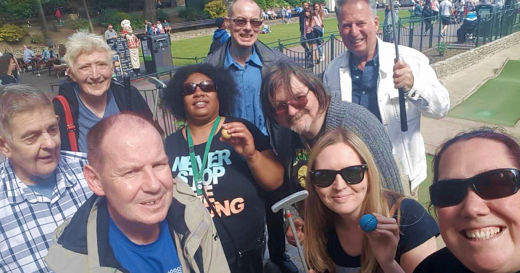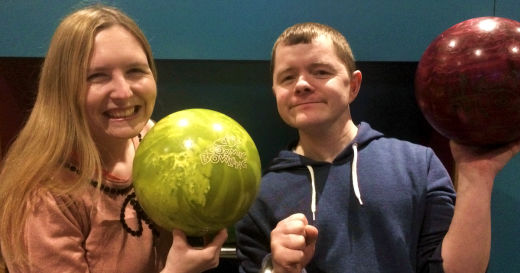How Bournemouth People First’s LifeLink project is building connections for life by encouraging meaningful relationships and contribution.
Authors: Amanda Frost and Anna Harris
People are talking a lot about loneliness these days. A survey by Mencap in 2016 found that half of people with a learning disability want to spend more time outside of their home and just under half do not think they spend enough time with their friends.
The Jo Cox Commission on Loneliness has started a national conversation about the scale and impact of loneliness in the UK, across all areas of society. Closer to home, Bournemouth People First’s Outright project (2012-14), which was cited as an example of good practice by the Community Connector Hub, aimed to improve life skills of people with a learning disability so that they could safely access and participate in community life. However, despite successes, we found that variations in the quality of support people were receiving was still holding them back from developing better social connections and relationships. This was due in part to stereotypical attitudes towards disability, lack of funding for support and a lack of personalised support. Our LifeLink project was then conceived to address these issues and enable people to become true citizens within their community.
LifeLink is a befriending scheme and, like Outright, is funded by the Big Lottery. It matches people with a learning disability to volunteers, who share the same interests, so that they can go out and do things together in their local community. We have successfully matched and trained dozens of pairs of people since our LifeLink project started in 2015.
The training we give to these pairs of buddies focuses on two aspects of community life:
We developed this approach to community inclusion from another of Bournemouth People First’s projects, our Citizen Checkers service. This service carried out quality checks involving people with a learning disability living in residential homes. It looked in particular at how people were supported to undertake activities outside of their home. We found a wide variation in the extent to which people were supported to be a part of their local community and needed a way to feedback our evaluation of this.
This is how we now classify our evaluation of these two aspects of community life:
1. The extent to which different types of activities can help people to be included in their local community:
2. The extent to which people become involved in their local community and are able to give something back.
Let’s use walking as an example:
We ask that our LifeLink buddies only do ‘green’ activities and also encourage them to do those things that help people to give something back to their local community. Although, we do not want our LifeLink volunteers to feel that they are doing something different or out of the ordinary. They are, after all, just going out!
We have had much success with LifeLink buddies going out and doing ‘green’ activities. So we can say that in terms of the nature of the activities people are doing, this has been very successful. However, it has been less easy to see the extent to which people have been enabled to give something back. Yes, everyone is out doing activities and the majority of these are in places where there are others around them, for example, cafes, pubs, cinemas and leisure centres. However, our LifeLink buddies are often doing this in isolation rather than making connections with other people in these settings.

There has been some success, though. We have seen people develop their shared interest into more active involvement, for example, two poets taking part in regular open mic poetry sessions. More people are going out in larger groups, as pairs of buddies arrange activities together, increasing the scope for social contact and interaction. Buddies are also becoming integrated into their partners’ social circle and becoming accepted as friends, rather than the person that volunteer is supporting. They are becoming people rather than service users and are no longer seen just as people that need care or support.
They really are becoming true citizens, though we recognise there is much further to go.

We know that some pairs of LifeLink buddies have made friendships that will last beyond the Big Lottery funding for this project. We want to provide opportunities so that more people can develop better friendships. We also want to encourage and support those friendships that have developed to do more to give something back in their local area. Our Big Lottery funding is coming to an end, and yet it feels that this is very much the beginning of a longer journey to overcoming isolation and loneliness, and building connections for life.
What happens next? Watch this space!
The publisher is the Centre for Welfare Reform.
Becoming True Citizens © Amanda Frost and Anna Harris 2017.
All Rights Reserved. No part of this paper may be reproduced in any form without permission from the publisher except for the quotation of brief passages in reviews.
community, disability, intellectual disabilities, England, Article